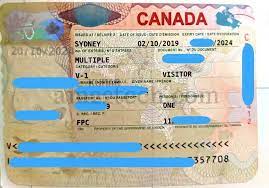Canada Visa for Filipino Citizens: A Comprehensive Guide

Canada, a country renowned for its stunning landscapes and welcoming environment, offers various visa options for Filipino citizens, including tourist visas, study permits, work visas, and permanent residency pathways. Whether you’re aiming to visit Canada for a short vacation, pursue higher education, or explore career opportunities, understanding the visa application process is crucial. In this guide, we’ll explore the different types of visas available, the application requirements, and the steps you need to take to successfully secure a visa to Canada. CANADA VISA FOR FILIPINO CITIZENS
Types of Canadian Visas for Filipino Citizens
- Visitor Visa
The Visitor Visa, also known as the Temporary Resident Visa (TRV), is ideal for Filipino citizens who wish to visit Canada for tourism, family visits, or short-term business trips. This visa allows you to stay in Canada for up to six months. To apply, you must demonstrate that you have sufficient funds to support yourself during your stay and that you will return to the Philippines after your visit.
- Study Permit
If you’re planning to pursue higher education in Canada, you’ll need a Study Permit. This visa is designed for international students who have been accepted into a recognized Canadian educational institution. To obtain a Study Permit, you must provide proof of acceptance from a designated learning institution (DLI), evidence of sufficient funds, and a clear intention to leave Canada upon completion of your studies.
- Work Permit
A Work Permit is required for Filipino citizens who have secured a job offer from a Canadian employer. This visa allows you to live and work in Canada for a specified period. Depending on the nature of your job, you may need a Labour Market Impact Assessment (LMIA) to prove that no Canadian citizen or permanent resident is available to fill the position. Certain work permits, such as those under international agreements or open work permits, have different requirements.
- Permanent Residency
For those seeking to make Canada their long-term home, applying for Permanent Residency (PR) is a viable option. The Express Entry system is one of the most popular pathways for skilled workers, while the Provincial Nominee Program (PNP) allows provinces to nominate individuals based on their skills and experience. To qualify, you must meet specific eligibility criteria, including work experience, educational background, and language proficiency.
Eligibility Requirements for a Canadian Visa
Visitor Visa Requirements
- Proof of Identity: Valid passport with at least six months of validity.
- Proof of Financial Support: Bank statements, employment letters, or other documents showing you have sufficient funds for your stay.
- Travel Itinerary: Details of your travel plans and accommodations in Canada.
- Ties to the Philippines: Evidence that you will return to the Philippines, such as employment, family, or property.
Study Permit Requirements
- Acceptance Letter: Proof of acceptance from a designated learning institution in Canada.
- Proof of Financial Support: Evidence that you can cover tuition fees, living expenses, and return transportation.
- Medical Exam: Depending on your country of residence, a medical examination might be required.
- Police Clearance: Some applicants may need to provide a police clearance certificate to prove they have no criminal record.
Work Permit Requirements
- Job Offer: A valid job offer from a Canadian employer.
- Labour Market Impact Assessment (LMIA): Required for some work permits to show that hiring a foreign worker will not negatively affect the Canadian labor market.
- Proof of Qualifications: Relevant educational and professional qualifications.
- Proof of Work Experience: Documentation of previous work experience relevant to the job offer.
Permanent Residency Requirements
- Express Entry Profile: Create an Express Entry profile and meet the criteria for one of the immigration programs (Federal Skilled Worker, Federal Skilled Trades, or Canadian Experience Class).
- Language Proficiency: Results from a recognized language test, such as IELTS or CELPIP.
- Educational Credentials Assessment (ECA): An evaluation of your foreign educational credentials.
- Work Experience: Relevant work experience that aligns with the job market needs in Canada.
The Application Process
- Preparing Your Application
Start by gathering all necessary documents and completing the application forms relevant to the visa you’re applying for. For online applications, you’ll need to create an account on the Immigration, Refugees, and Citizenship Canada (IRCC) website. If applying through a paper application, download and complete the required forms. CANADA VISA FOR JAPANESE
- Submitting Your Application
For most visa types, you can submit your application online or through a VFS Global office in the Philippines. Ensure that all forms are accurately completed and that you’ve included all required documents. Double-check for any additional requirements based on the type of visa you’re applying for.
- Paying the Fees
Visa applications typically require payment of processing fees. The amount varies depending on the type of visa. Payment can be made online through the IRCC website or via other accepted methods if applying through a VFS office.
- Attending an Interview
In some cases, you may be asked to attend an interview at the Canadian Embassy or Consulate. The purpose of the interview is to verify the information provided in your application and assess your eligibility for the visa.
- Receiving Your Visa
Once your application is processed, you’ll receive a decision on your visa. If approved, your visa will be stamped in your passport or electronically issued. Review the visa details carefully and ensure you comply with the visa conditions during your stay in Canada.
Tips for a Successful Application
- Accuracy is Key: Ensure all information provided is accurate and truthful. Incomplete or incorrect applications can lead to delays or rejections.
- Documentation: Provide clear and legible copies of all required documents. Missing documents can result in delays or refusals.
- Follow Instructions: Adhere to the specific instructions provided by IRCC or the VFS Global office for your application type.
- Seek Professional Help: If you’re unsure about any part of the application process, consider consulting with an immigration consultant or lawyer for expert advice.
Conclusion
Securing a Canadian visa as a Filipino citizen involves understanding the different visa options, meeting eligibility requirements, and following the application process diligently. Whether you’re visiting for a short period, studying, working, or seeking permanent residency, careful preparation and attention to detail will enhance your chances of a successful application. With Canada’s diverse opportunities and vibrant culture, obtaining a visa could be the first step towards an exciting new chapter in your life.
